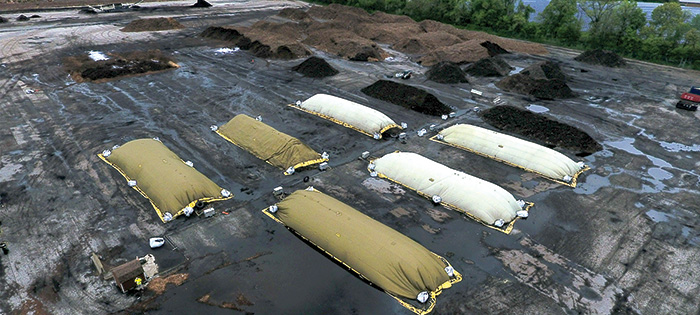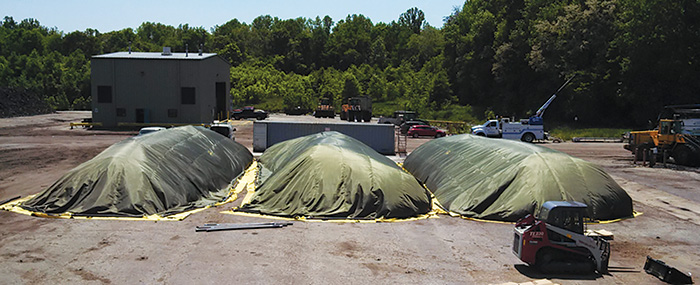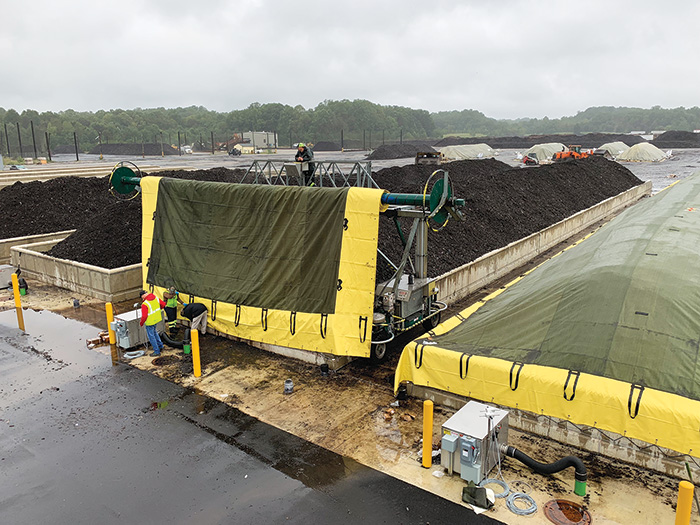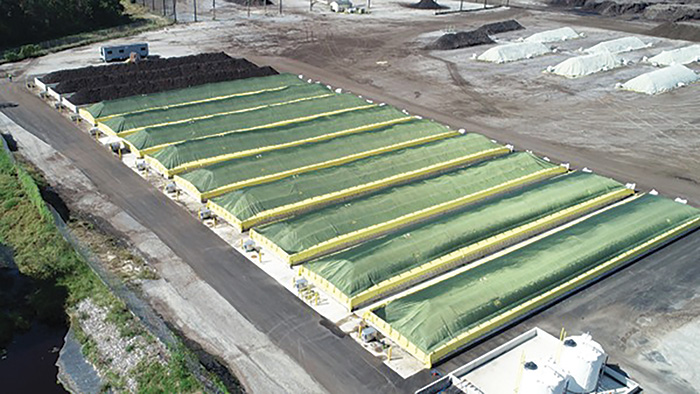By embracing innovation and carefully executed expansion, Prince George’s County has positioned itself at the forefront of handling food waste responsibly.
By Scott Woods
For decades, Prince George’s County’s Organics Composting Facility located in Upper Marlboro, MD, has established itself as a leader in responsible organics management. The facility, dating back to the 1980s, consistently produces high-quality compost from yard trim using the windrow turning process and branded as LeafGro® that sells out every year. Prince George’s County’s elected officials and the County’s Department of the Environment made the important decision to invest in infrastructure, resources, and collections to receive and process food waste. This major waste diversion effort to steer food scraps away from being landfilled (where it only generates greenhouse gases for years or even decades) to being composted, has allowed them to create an all-natural organic rich soil amendment for use on gardens, flower beds, tree plantings, and lawns. Food waste is now incorporated with yard trim to create a product branded as Leafgro® Gold.


The Challenge: Time, Capacity, and Food Waste
While effective, the facility’s established open windrow composting method required roughly eight months to yield a high-quality finished compost. This timeline, along with potential odor concerns, posed limitations when considering the incorporation of food scraps. To tackle this, Prince George’s County sought a solution facilitating faster processing, higher capacity, and the ability to manage food scraps without an increase in odor or contact water. The main driver for this technological change was the potential to divert food scraps from the landfill and introduce them into the compost facilities as a new feedstock. The Sustainable Generation (SG) technology provided increased process controls, odor control and clear separation of stormwater from contact water. In addition, the SG system helped to move from an eight-month process to an eight-week process in addition to reducing the needed footprint for composting all while increasing the facility throughput.
Sustainable Generation is a leader in optimizing composting operations, committed to reducing costs, streamlining processes, and maintaining stringent environmental standards. With a proven track record dating back to 1998 and over 400 installations worldwide, our innovative system accelerates natural composting, striking a balance between environmental preservation and economic efficiency.
In the organics management sector, numerous challenges abound, including space limitations, processing time, energy consumption, water management, climate resilience, odor mitigation, greenhouse gas emissions, and community acceptance. Through our SG Advanced Composting™ Technology, we effectively address these obstacles, fostering financial stability through efficient implementation.
Backed by a team with extensive experience in owning and operating organic waste processing facilities, we possess firsthand insights into the complexities involved. By collaborating closely with your team, we tailor solutions to design, construct, and manage composting systems that not only maximize efficiency and effectiveness but also ensure long-term financial viability

Pilot Project: Proving Sustainable Generation’s Advanced Composting™ Technology
While the County’s Department of the Environment, Recycling Section was researching and introducing the idea of food scrap composting, the Prince George’s County Council was instrumental in providing its support by passing legislation directing the agency to pilot food scrap composting. In 2013 Prince George’s County and Maryland Environmental Service (MES) partnered with SG to implement a food waste pilot project to create an end-to-end process for food scraps collection, source separation, transportation, processing, and compost marketing. SG supplied its SG MOBILE® System with GORE® Covers for the pilot. “The goal was to demonstrate the capabilities needed for a full-scale organics diversion program and then develop a plan to scale up to implement the County’s legislation, which we successfully executed,” said Marilyn Naumann, Associate Directory Resource Division of Department of Environment, Prince George’s County. The pilot project included proving the SG Mobile® System with GORE® Covers technology’s ability to produce as high-quality product in eight weeks as their existing Leafgro® compost did in the existing eight-month open windrow turning process. Marilyn went on to say, “The pilot process benchmarked the yard waste composting and food scraps at varying mix ratios with yard waste while yielding a high-quality finished product ensuring that the compost quality met or exceeded the LeafGro® product to protect our compost product brand.”
“The pilot ran in multiple phases with one SG MOBILE® System acting as a control test that benchmarked yard waste composting against their existing windrow turning operation and two more systems were used to test food waste composting mix recipes of 10, 25, and 50 percent by weight food waste mix,” said Scott Woods, Founder and CEO of Sustainable Generation, adding, “Throughout these phases, crucial performance metrics were closely monitored. Alongside traditional factors like time and temperature, the project specifically tracked compost quality and odor control. Results consistently demonstrated a high-quality product was created using an eight-week process and that despite high food waste percentages, odor levels remained manageable due to the system’s design.”

Triumphant Results
Across multiple phases, the pilot consistently outperformed the traditional windrow method. The most striking improvement was processing time—dramatically reduced from eight months to a mere eight weeks. Alongside this efficiency gain, food waste was successfully incorporated at ratios of up to 50 percent without compromising final compost quality or increasing odor issues. Notably, the nutrient analysis showed the SG MOBILE® System-produced compost was comparable, if not slightly superior, to the county’s established product. These results provided crucial validation for the MES to consider a large-scale change.
Scaling with a Measured Approach
Rather than an immediate overhaul, Prince George’s County and MES demonstrated prudence with a phased scaling strategy. The initial expansion phase relied on three piloted SG MOBILE® Systems, providing increased capacity while collecting further operational data to inform future decisions. This allowed MES operators to gain hands-on experience with the new systems, optimizing workflows, and staff training. MES personnel noted that the SG technology was intuitive to manage, facilitating a smooth transition. After this initial phase, they scaled up to four SG MOBILE® Systems in 2014 and expanded again to eight in 2016 as they grew their food waste composting pilot program.
The EPA grant-funded residential pilot, comprised of 200 hundred households, coincided with the decision to expand the eight SG Mobile systems. Recognizing the positive environmental impact of food waste collection, County Executive Angela Alsobrooks, sanctioned a phased expansion over a three-year period to countywide. Approximately 280K households within County contracted service areas are equipped to participate in this nationally acclaimed project.
In 2018, Prince George’s County transitioned the facility to full-scale leveraging SG Bunker® Systems and in-ground leachate management infrastructure, significantly boosting capacity. Today, the facility can process 65,000 tons of organic waste annually. This includes both yard waste and a substantial proportion of food waste, sourced from commercial, institutional, residential, and public school streams.
Benefits Beyond the Compost Pile
The project’s success offers benefits extending far beyond efficient composting. The facility significantly reduces greenhouse gas emissions by diverting food waste from landfills. Estimates suggest the project results in an annual reduction equivalent to removing thousands of cars from the road. The enhanced odor control and shorter processing timeline positively impact the surrounding community.
Moreover, the project’s success could pave the way for increased food waste composting initiatives and policy changes throughout the region, demonstrating both the feasibility and desirability of such programs. This aligns with a growing industry trend, as municipalities nationwide recognize the environmental and economic benefits of diverting food waste.
Lessons for the Compost Industry
The Prince George’s County Organics Composting Facility offers a blueprint for facilities considering major upgrades:
- Food Scraps Viability: Even facilities focused on yard waste can successfully integrate substantial amounts of food waste, maintaining quality standards.
- Piloted Innovation: Thoroughly test new technologies on a smaller scale before fully committing, ensuring real-world performance aligns with expectations.
- Phased Growth: A data-driven, step-by-step scaling approach allows for adjustments and minimizes risk.
- Community Impact: Prioritize odor control and efficient processing to maintain positive relationships with surrounding areas.
- Scaling Challenges: While the phased approach was successful, Prince George’s County did need to adjust feedstock pre-processing methods to ensure a proper feedstock mix recipe for the new system. This highlights the importance of considering all operational aspects when upscaling.
- The Power of Partnerships: Collaborating with technology providers like Sustainable Generation allows facilities to tap into specialized expertise and proven solutions. This can accelerate the adoption of new composting methods.
- Continuous Learning: Prince George’s County’s commitment to collecting data before and after scaling highlights the importance of ongoing analysis. This allows for informed decision-making and the potential for further process optimization in the future.
- The Economic Side: While the article does not address cost in detail, composting facilities should consider the long-term economic benefits of increased capacity and efficiency. Food waste composting can open new revenue streams through tipping fees and high-quality compost sales.
Embracing Innovation
The Prince George’s County Organics Composting Facility exemplifies how established operations can adapt to meet the evolving challenges of organic waste management. By embracing innovation and carefully executed expansion, Prince George’s County has positioned itself at the forefront of handling food waste responsibly. The Prince George’s County facility now serves as a model for other jurisdictions municipalities, demonstrating the potential for facilities of all sizes to become leaders in sustainable waste management. The lessons learned highlight a path forward for the compost industry, emphasizing the potential to tackle food waste, improve efficiency, and foster a more circular economy. | WA
Scott Woods is CEO and Founder of Sustainable Generation. He is an experienced technologist and thought leader in implementing technology solutions to solve infrastructure problems. Scott created the company to provide scalable, repeatable, organic waste processing and composting solutions to the private and public sectors. He is the former CEO of a compost facility developer and owner/operator. Prior to that, Scott was the Global Remote Services Vice President at Sun Microsystems with over 30 years of experience applying technology to solve business problems and create competitive advantages in the telecom, information technology, government services and waste conversion industries. He can be reached at [email protected] or visit www.sustainable-generation.com
